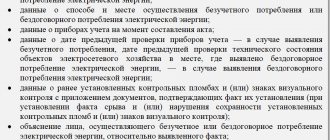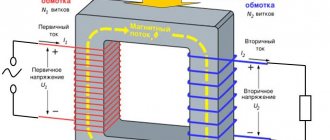Was there any non-contractual energy consumption?
After the change of general director of Zarechye LLC in 2021, the new management of the enterprise came to Mosenergosbyt to conclude an energy supply agreement. At the same time, PJSC Moscow United Electric Grid Company (hereinafter referred to as MOESK), having learned that the enterprise was in the process of concluding an agreement, sent a representative to the location of the company, who drew up an act on non-contractual electricity consumption in the period from January 23, 2017 to January 22, 2021 for a total amount of about 3 million rubles.
Naturally, there was no non-contractual consumption on the part of the company - the meter was sealed several days before the act was drawn up - and the company was not going to pay the tenfold tariff.
Then MOESK filed a claim in court against Zarechye LLC for the recovery of unjust enrichment in connection with non-contractual consumption of electricity in the amount of over 2.8 million rubles, as well as more than 360 thousand rubles. interest for the use of other people's funds.
The courts of three instances refused to satisfy the claims (case No. A41-8719/2020), however, it is possible that the plaintiff will try to appeal the court decisions to the Supreme Court of the Russian Federation.
Thus, the key conclusions of the courts were:
- Notification of the consumer about the preparation of an act on non-contractual consumption must be sent in advance by the company authorized to draw up such an act. Confirmation of the contents of the notice envelope must be provided to the court, otherwise the sending of the notice may be considered unproven;
- the act of non-contractual consumption must be signed only by an authorized person, whose authority must be presented to the court immediately, and not after the decision in the case;
- actions cannot be considered non-contractual consumption if electricity was used during the period of concluding a contract with an energy sales company;
- in the absence of evidence of disinterest in relation to the energy sales company of the persons involved as witnesses when signing the act in the absence of the consumer, such an act is flawed.
The number of such disputes with the participation of MOESK (i.e. only in Moscow and the Moscow region) for 2021 amounted to more than 400, which can be easily found in a search in the file index of cases of the CAD.Arbitr system.
In fact, the only regulatory legal act regulating the relations of energy sales companies with consumers is Decree of the Government of the Russian Federation of May 4, 2012 No. 442 “On the functioning of retail markets for electric energy, complete and (or) partial limitation of the mode of consumption of electric energy” (hereinafter - Resolution No. 442), which approved the Basic Provisions for the functioning of retail electricity markets (hereinafter referred to as the Basic Provisions).
These Basic Provisions define all aspects related to energy consumption: in particular, the form of notification of the preparation of an act on unaccounted consumption, the act itself when consumption is considered non-contractual, etc.
I would like to draw attention to the important nuances of this dispute, in which we represented the interests of the defendant company.
Firstly, most of the notifications on behalf of MOESK were sent by another legal entity. There was also no description of the attachment. Accordingly, it is practically impossible for the plaintiff to confirm that the consumer has been properly notified in this case. This is a violation of the procedure for drawing up an act on unaccounted consumption and leads to its depravity.
Secondly, the plaintiff did not present the documents of the person who signed the act on unaccounted consumption and his authority to do so in the first instance, despite the repeated postponement of court hearings due to the pandemic. When challenging the court's decision, the plaintiff tried to convince a higher authority that he could additionally submit supporting documents to the court, even after the defendant pointed out the violations committed by the plaintiff after four court hearings.
Thirdly, according to the basic rules for drawing up an act on unaccounted consumption in the absence of the consumer, two witnesses are required who sign the act to confirm that they saw how it was drawn up. MOESK often uses acts with signatures of four people (only their combination differs). All references to these persons can be easily found through CAD.Arbitr and the obvious dependence of these witnesses on the energy sales company can be substantiated. For example, the Ninth Arbitration Court of Appeal, in a ruling dated February 12, 2021 in case No. A40-238357/18, noted that the persons who signed the act on non-contractual consumption repeatedly appear in arbitration disputes as witnesses when allegedly drawing up PJSC "MOESK" similar acts.
Fourthly, the burden of proving the presence (or absence) of attesting witnesses’ interest in an energy-saving company is often shifted to the defendant. Thus, the plaintiff tried to prove that the disinterest of the witnesses is assumed a priori; it is the defendant who must prove that the witnesses indicated in the act are persons interested in relation to the plaintiff, and justify this not simply by the number of judicial acts in which the same names of witnesses from the plaintiff appear , but also to find these individuals and find out where they actually work.
In my opinion, the situation with “regular” witnesses has become one of the main arguments for the arbitration courts’ refusal to satisfy claims.
According to paragraph 2 of section. I of the Basic Provisions “non-contractual consumption of electrical energy” is the unauthorized connection of power receiving devices to power grid facilities and (or) consumption of electricity in the absence of an agreement ensuring the sale of electrical energy (power) in retail markets, its consumption during the period of suspension of supply under an agreement ensuring sale of electricity (power) in retail markets, in connection with the introduction of a complete limitation of the electricity consumption regime in cases provided for by the Rules for the complete and (or) partial limitation of the electricity consumption regime, approved by Resolution No. 442.
Electricity consumption in the absence of a concluded agreement ensuring the sale of electricity (power) on retail markets is not considered non-contractual:
- within two months from the date established for the guaranteeing supplier to accept consumers for service;
- during the period of conclusion of the specified agreement when applying to a consumer intending to conclude an energy supply agreement (purchase and sale (supply) of electricity (power)) with a guaranteeing supplier; when changing the owner of the energy receiving device and in the event of concluding an agreement ensuring the sale of electricity (power) in retail markets, until completion of the technological connection of power receiving devices, subject to compliance with the deadlines established for submitting to the guaranteeing supplier an application for concluding an energy supply agreement (purchase and sale (supply) of electricity (power)) or returning to the guaranteeing supplier the draft agreement signed by the applicant (protocol of disagreements, additional agreement to the current agreement ensuring sale of electrical energy (power) to the applicant on the retail market).
Probably, if the energy sales company had taken care of high-quality preparation for the consideration of the case in court and had gone out to draw up a report, formally it would have been easier for it. However, in my opinion, this does not detract from the fact that the desire of the monopoly-unequal party to the contract to recover the same thing twice, and even tenfold, does not correspond to the principle of sustainability of civil turnover.
What struck us most in this dispute was that the energy sales companies constantly interact with each other, that after the conclusion of the contract, one of them received full payment for the electricity consumed by the company, and in the second and third instances they referred to the lack of payment. At the same time, they did not forget about the electricity supply agreement, which was presented by the plaintiff (MOESK), and not Mosenergosbyt as a third party, which, in my opinion, clearly indicates their constant communication and exchange of data on consumers.
No less interesting is the fact that initially the plaintiff asked to recover 3.2 million rubles from the defendant, but the materials contain an alternative calculation, also presented by the plaintiff, in which the amount of debt is only 600 thousand rubles!
Non-contractual and unmetered electricity consumption
Issues of non-contractual and unaccounted consumption of electrical energy are regulated by the “Basic Provisions for the Functioning of Retail Electricity Markets”, approved by Decree of the Government of the Russian Federation of May 4, 2012 N 442 (Section I, X) (hereinafter referred to as the Basic Provisions).
Cases of non-contractual consumption of electrical energy include:
— unauthorized connection of power receiving devices to power grid facilities;
— consumption of electrical energy in the absence of a duly concluded agreement ensuring the sale of electrical energy (power) in retail markets.
Cases of non-contractual consumption of electricity do not apply to cases of consumption of electricity in the absence of an agreement ensuring the sale of electricity (power) in retail markets within 2 months from the date established for acceptance by the supplier of last resort for servicing consumers.
Upon detection of non-contractual consumption of electrical energy, the network organization draws up a report on unaccounted consumption of electrical energy and, no later than 3 working days from the date of its preparation, sends it to the person who carried out the non-contractual consumption. Later, a calculation of the volume of non-contractual consumption of electrical energy (power) and an invoice for payment of electrical energy in the volume of non-contractual consumption are sent.
The volume of non-contractual consumption of electrical energy is determined based on the value of the permissible long-term current load of each input wire (cable) by calculation, in accordance with paragraph 2 of Appendix No. 3 to the Basic Provisions, for the period of time during which the non-contractual consumption of electrical energy was carried out, but no more than in 3 years.
In this case, the period of time during which non-contractual consumption of electrical energy was carried out in the form of unauthorized connection of power receiving devices to electrical grid facilities is determined from the date of the previous control check of the technical condition of electrical grid facilities in the place where the fact of non-contractual consumption of electrical energy was later revealed, until the date identifying the fact of non-contractual consumption and drawing up a report on unaccounted consumption of electrical energy.
The cost of electrical energy in the volume of non-contractual consumption determined in accordance with this paragraph is determined based on the prices (tariffs) specified in Section IV of the Basic Provisions.
A person who has carried out non-contractual consumption is obliged to pay an invoice to pay the cost of electrical energy in the amount of non-contractual consumption within 10 days from the date of receipt of the invoice (clause 196 of the Basic Provisions).
Cases of unaccounted consumption of electrical energy include:
facts of consumption of electrical energy in violation of the terms of the energy supply contract (purchase and sale (supply) of electrical energy (power), contract for the provision of services for the transmission of electrical energy) and the Basic provisions of the procedure for accounting for electrical energy on the part of the consumer (buyer), expressed in the following:
- interference with the operation of a metering device (metering system), the responsibility for ensuring the integrity and safety of which is assigned to the consumer (buyer), including violation (damage) of seals and (or) visual control signs applied to the metering device ( accounting system);
— failure to comply with the deadlines established by the contract for notification of the loss (malfunction) of a metering device (metering system);
— commission by the consumer (buyer) of other actions (inactions) that led to distortion of data on the volume of electrical energy (power) consumption.
The fact of unmetered consumption of electrical energy can be detected, including during an inspection of the condition of metering devices, as well as during an inspection of the metering device before its dismantling.
Upon detection of unaccounted consumption of electrical energy, the network organization draws up a report on unaccounted consumption of electrical energy and, no later than 3 working days from the date of its preparation, sends it to the person who carried out the unaccounted consumption.
The volume of unmetered consumption of electrical energy is determined using the calculation method provided for in subparagraph “a” of paragraph 1 of Appendix No. 3 to the Main Annexes. The volume of unaccounted consumption of electrical energy (power) is determined from the date of the previous control check of the metering device until the date of detection of the fact of unaccounted consumption of electrical energy (power) and drawing up a report on unaccounted consumption of electrical energy. If such an inspection was not carried out within the planned time frame, it is determined from the date no later than which it should have been carried out in accordance with the Basic Provisions.
The cost of electrical energy in the volume of unaccounted consumption is included by the guaranteeing supplier (energy sales, energy supply organization) in the invoice issued to the consumer (buyer) for payment of the cost of electrical energy (power) purchased under an agreement ensuring the sale of electrical energy (power) for that billing period, in in which the fact of unaccounted consumption was identified and a report on unaccounted consumption of electrical energy was drawn up and sent to the consumer.
The consumer (buyer) is obliged to pay the specified invoice within the period specified in the agreement ensuring the sale of electrical energy (power).
From the date of drawing up the act on unaccounted consumption of electrical energy, the volume of consumption of electrical energy (power) and the volume of services provided for the transmission of electrical energy are determined in the manner prescribed by the requirements of paragraph 166 of the Basic Provisions for calculating the volume of consumption of electrical energy (power) and services provided for the transmission of electrical energy for the case of failure to provide meter readings within the established time frame starting from the 3rd billing period.
The document recording the unaccounted, non-contractual consumption of electrical energy (power) is the act of unaccounted for electricity consumption. The requirements for this act are established by paragraph 193 of the Basic Provisions.
The act on unaccounted consumption of electrical energy must contain the following data:
— about a person carrying out unmetered or non-contractual consumption of electrical energy;
— on the method and place of unaccounted or non-contractual consumption of electrical energy;
— about metering devices at the time of drawing up the report;
- on the date of the previous inspection of metering devices - in case of detection of unmetered consumption, the date of the previous inspection of the technical condition of electric grid facilities in the place where non-contractual consumption of electrical energy was detected - in case of detection of non-contractual consumption;
— explanations of the person carrying out unmetered or non-contractual consumption of electrical energy regarding the identified fact;
— comments on the drawn up act (if any).
When drawing up an act on unaccounted consumption of electrical energy, the consumer who carries out the unaccounted consumption (the guaranteeing supplier serving him (energy sales, energy supply organization)) or the person who carries out the non-contractual consumption of electrical energy must be present.
The refusal of a person carrying out unaccounted or non-contractual consumption of electrical energy to sign the drawn up act on unaccounted for unaccounted consumption of electrical energy, as well as his refusal to be present when drawing up the act must be recorded, indicating the reasons for such refusal, in the act of unaccounted for consumption of electrical energy, drawn up in the presence of 2 disinterested persons










